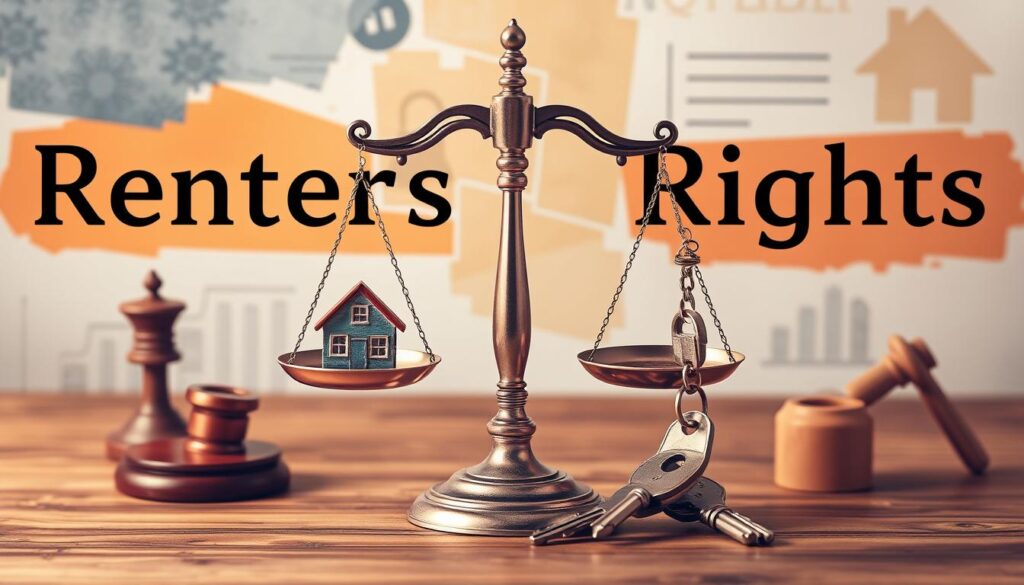Facing eviction can be stressful and have long-lasting effects on your finances. This guide explores how eviction impacts your credit score and rental history. We’ll discuss tenant screening, credit effects, and steps to lessen the impact.
We’ll provide expert advice on navigating landlord-tenant laws and credit repair strategies. You’ll learn how to protect your rights and rebuild your rental history. Our goal is to help you regain housing stability.
Key Takeaways
- Evictions can severely impact your credit score and make finding future housing difficult.
- Tenant screening reports and laws are crucial for understanding your renter rights.
- Credit counseling and budgeting can help rebuild your finances after eviction.
- Advocating for housing stability provides support during this challenging time.
- Building a positive rental history improves your chances of securing future housing.
Understanding the Impact of Eviction on Credit
Evictions can severely damage your credit score. This makes it hard to rent, get loans, or find jobs. Understanding these effects is vital for your financial future.
When reported to credit bureaus, evictions can harm your creditworthiness. This impact can last for up to seven years on your credit report.
Tenant Screening and Rental History
Landlords often check rental history and credit reports. A past eviction can make finding new housing tough. Landlords may avoid renting to those with eviction histories.
This creates a cycle of difficulty. Poor rental history further hurts your credit score. It also limits your housing options.
Credit Score Influence
Evictions typically appear on major credit bureau reports. They can cause a severe drop in your credit score. This drop can be as much as 100-200 points.
Low credit scores make getting loans and credit cards harder. They can even affect job opportunities that require good credit.
| Metric | Impact of Eviction |
|---|---|
| Credit Score | Significant drop, potentially 100-200 points |
| Rental History | Landlords may be hesitant to rent to you |
| Loan Eligibility | Reduced access to credit, higher interest rates |
Evictions have far-reaching effects on credit and rental history. Taking steps to maintain good rental standing is crucial. This helps protect your credit score and future opportunities.
Eviction and Housing Insecurity
Eviction deeply affects housing security, leading to financial instability. It makes finding a new home difficult due to negative rental history. This creates a major obstacle to stable, affordable housing.
Housing insecurity impacts more than just shelter. It can hinder employment, disrupt children’s education, and limit access to essential services. These challenges can harm mental and physical health long-term.
Tackling housing insecurity needs teamwork. Policymakers, advocates, and community groups must join forces. They can expand affordable housing, protect tenants, and offer support services.
“Eviction can lead to a cascade of negative outcomes, making it increasingly difficult for individuals to find stable, affordable housing and regain their financial footing. Addressing this issue requires a holistic approach that prioritizes housing security as a fundamental human right.”
Understanding eviction’s causes and effects is crucial. It impacts individuals, families, and entire communities. By supporting those facing housing instability, we can build a fairer society.
Everyone deserves access to safe, affordable housing. Taking action now can help create a more inclusive community for all.
Navigating Landlord-Tenant Laws
Knowing landlord-tenant laws is vital for renters. These laws differ by location. Understanding them protects your renter’s rights during evictions and other legal issues.
Renter’s Rights and Responsibilities
Renters have important rights landlords must respect. These include habitable living spaces, privacy, and freedom from discrimination.
Renters also have duties to fulfill. Paying rent on time, maintaining the property, and following lease terms are key responsibilities.
To protect your rights, take these steps:
- Review your lease agreement carefully and understand its terms.
- Research the landlord-tenant laws in your state or local jurisdiction.
- Familiarize yourself with the eviction process and your rights during the process.
- Communicate openly with your landlord about any issues or concerns.
- Document any interactions or incidents related to your tenancy.
Being proactive helps you navigate complex landlord-tenant laws. This approach safeguards your renter’s rights effectively.

“Understanding your rights as a renter is essential in maintaining a positive and stable living situation.”
eviction on credit
An eviction on your credit report can severely impact your future. It makes it harder to find housing, get loans, or secure employment. Understanding this impact is vital for taking steps to reduce the damage.
Evictions stay on credit reports for up to seven years. This negative mark affects your credit score and future rental prospects. Landlords often reject applicants with eviction histories during tenant screenings.
Lenders may view evictions as red flags. This can make getting loans, mortgages, or credit cards more difficult. Some employers also check credit reports during hiring, potentially hurting job prospects.
“An eviction can haunt you for years, making it challenging to find a new place to live or secure other financial opportunities. It’s essential to address the issue proactively and explore ways to mitigate the long-term impact.”
Recovering from an eviction is tough, but possible. Seek guidance from credit counseling services. Budget carefully and work on building a positive rental history.
These strategies can help you repair your credit. They’ll also aid in regaining financial stability after an eviction.
Repairing Your Credit After an Eviction
Rebuilding credit after an eviction is key to financial stability. Credit repair strategies and credit counseling services can help you regain control of your creditworthiness. These tools are effective in improving your financial situation.
Leverage Credit Counseling Services
Credit counseling services offer valuable guidance after an eviction. They employ trained professionals who provide personalized advice and support.
These experts can help develop plans to address negative items on your credit report. They also negotiate with creditors to resolve debts or arrange better payment terms.
Additionally, they offer budgeting and financial management assistance. This helps improve your credit utilization and payment history.
Implement Effective Credit Repair Strategies
Besides professional help, you can use credit repair strategies to improve your credit score. Start by disputing any inaccurate information on your credit report.
Try negotiating with landlords or collection agencies to remove the eviction from your history. Make all bills on time, including utilities and subscriptions, to establish positive payment history.
Reduce your credit utilization ratio by paying down debts. Consider becoming an authorized user on someone else’s credit card to build credit history.
“Credit repair is a marathon, not a sprint. With patience and persistence, you can overcome the challenges posed by an eviction and emerge with a stronger financial foundation.”
Preventing Future Evictions
Eviction aftermath can be tough. Focus on strategies to prevent future issues. Know your rights and responsibilities as a tenant. Understand your landlord’s lease termination policies.
This knowledge helps maintain a positive rental history. It also helps avoid potential conflicts. Staying informed is key to a stable housing situation.
Lease Termination Policies
Review termination policies before signing a lease. Learn about grounds for lease termination. Know the required notice period and any penalties for early termination.
This understanding helps navigate potential disputes. It also aids in avoiding future evictions. Being informed protects your interests as a tenant.
- Understand the conditions that may lead to lease termination, such as non-payment of rent, property damage, or violations of the lease agreement.
- Be aware of the required notice period for lease termination, which can vary depending on your location and the terms of your lease.
- Inquire about any fees or penalties that may be imposed for early lease termination or breaking the rental agreement.
Open communication with your landlord is crucial. Respond quickly to any concerns they raise. Work together to solve problems that come up.
This approach helps prevent lease termination policies issues. It’s also key in preventing future evictions. Good landlord-tenant relationships are vital for housing stability.
| Rental Policies | Consequences of Violation | Preventive Measures |
|---|---|---|
| Non-payment of Rent | Potential Eviction | Set up automatic payments, communicate with landlord if facing financial difficulties |
| Property Damage | Deduction from Security Deposit, Potential Eviction | Maintain the rental property in good condition, report any issues promptly |
| Violation of Lease Agreement | Potential Eviction | Carefully review and comply with the terms of the lease, communicate with landlord |
Understanding lease termination policies is crucial. Take steps to maintain a positive rental history. This helps prevent future evictions effectively.
By doing so, you ensure housing stability. You also build a strong foundation for your renting future.

Tenant Screening Reports Demystified
Tenant screening reports are vital in the rental process. They give landlords insights into a potential tenant’s history. These reports help both landlords and tenants navigate the rental market better.
The reports cover an applicant’s rental history and credit score. They also show previous evictions or legal issues. Landlords use this data to assess risks when renting to someone.
This information helps protect their property. It also reduces potential financial problems.
What’s Included in a Tenant Screening Report?
- Rental History: Details about previous rental properties, including payment records, lease violations, and any evictions.
- Credit Score: An assessment of the applicant’s creditworthiness, which can impact their ability to pay rent on time.
- Criminal History: Information about any criminal convictions or pending legal issues that may be relevant to the rental application.
- Eviction Records: A record of any previous evictions, which can significantly influence a landlord’s decision to rent to an applicant.
Understanding these reports helps create fair rental processes. It leads to more successful tenancies. It also builds stable communities.
“Tenant screening reports are a critical tool for landlords to assess the risk of renting to a particular individual, but it’s important that the information contained within these reports is accurate and up-to-date.”
Accuracy in tenant screening reports is crucial. Mistakes can greatly affect both landlords and tenants. Tenants can dispute wrong information.
Landlords should carefully check the details in these reports. This helps create a fair rental market. It benefits everyone involved in the process.
Advocating for Housing Stability
Evictions can be stressful, but you can fight for your home. Learn about resources and strategies to keep your living situation secure.
Know your local tenant rights and landlord-tenant laws. Many areas offer free legal help for renters facing eviction. These resources can explain your rights and options.
Community organizations and nonprofits can provide valuable support. They often have programs to help maintain housing stability. These may include rental assistance and landlord-tenant mediation.
If eviction is imminent, attend housing court hearings. Prepare by gathering all relevant documents. Explain your situation clearly and be open to negotiating with your landlord.
The road to housing stability requires determination and a varied approach. Use available resources and stand up for your rights. This can help you keep your home and avoid eviction’s negative effects.
Building a Positive Rental History
A strong rental history is vital for future housing opportunities. It opens doors to better properties and terms. Good tenant-landlord relationships and a clean record are key.
Communication with Landlords
Open communication with landlords builds a positive rental history. Be proactive, responsive, and transparent in your dealings. Address issues promptly and pay rent on time.
Keep your landlord informed of any changes or concerns. This approach shows your reliability and responsibility as a tenant.
- Maintain an open dialogue with the landlord, addressing concerns and requests in a timely manner.
- Adhere to the terms of the lease agreement and avoid any lease violations.
- Provide advance notice when planning to vacate the property, allowing for a smooth transition.
- Request a written confirmation of a satisfactory move-out inspection to document the positive rental history.
Professional relationships with landlords prove your commitment to property care. This builds a rental history that showcases your reliability and responsibility.
| Positive Rental History Strategies | Benefits |
|---|---|
| Timely rent payments | Demonstrates financial responsibility and reliability |
| Proactive communication with landlords | Fosters positive relationships and trust |
| Adherence to lease terms | Shows respect for property and commitment to tenancy |
| Proper move-out procedures | Leaves a lasting positive impression and documentation |
These strategies help build a solid rental history. They show your reliability and care for the property. This can lead to better housing options in the future.

The Emotional Impact of Eviction
Eviction is a distressing experience that goes beyond losing a home. It often leads to feelings of shame, anxiety, and depression. Individuals and families face intense emotional and psychological challenges during this time.
Housing insecurity can severely impact mental health. Eviction has been linked to increased risk of depression, substance abuse, and even suicide. Those affected may struggle to regain a sense of safety and stability.
“Eviction is not just about losing your home – it’s about losing your community, your support system, and your sense of self. The emotional scars can last for years.”
Coping with eviction’s emotional impact requires a multi-pronged approach. Seeking help from mental health professionals can be valuable. Joining support groups and accessing community resources are also helpful strategies.
The emotional toll of eviction is complex and deeply personal. By providing resources for coping and recovery, we can support those facing housing insecurity. This approach fosters a more compassionate environment for affected individuals.
Rebuilding Credit and Financial Health
Rebuilding credit after an eviction is challenging but achievable. With the right strategies, you can improve your credit score and regain financial stability. Let’s explore practical steps to enhance your financial well-being.
Budgeting and Debt Management
A comprehensive budget is key to financial recovery. Examine your income and expenses closely. Identify areas to cut back and allocate funds towards debt management and rebuilding credit.
Focus on paying down high-interest debts first. Consider negotiating with creditors for more manageable payment plans. This approach can help you regain control of your finances.
- Analyze your spending patterns and categorize expenses
- Allocate funds towards debt repayment and credit building
- Explore debt consolidation or negotiation options
- Implement a realistic budget and track your progress
Address any outstanding debts that may have led to your eviction. Work with creditors to understand your options. These might include payment plans, debt consolidation, or debt forgiveness programs.
The journey to rebuilding credit requires discipline and patience. By focusing on budgeting and debt management, you’ll pave the way for financial stability. Stay proactive and communicative to regain control of your financial future.
Legal Recourse for Wrongful Evictions
Unjustified evictions may be challenged legally. Knowing your tenant rights is key to protecting your housing security. You can take action if you believe your eviction was unlawful.
Wrongful evictions often occur when landlords skip proper procedures. This includes insufficient notice or trying to remove you without a court order. In such cases, you might stop the eviction or seek compensation.
- Consult a tenants’ rights organization or a local housing attorney to understand your specific legal options.
- Review your rental agreement and local landlord-tenant laws to identify any violations by your landlord.
- Document all interactions with your landlord, including any notices or demands, to build a strong case.
False claims can be grounds for challenging an eviction. These may include made-up lease violations or rent non-payment. Legal counsel can help you navigate this process and protect your rights.
“Wrongful evictions can have devastating consequences, both financially and emotionally. Understanding your legal options is crucial in safeguarding your housing stability.”
Laws about legal recourse for wrongful evictions vary by location. Research your local laws carefully. Seek professional guidance to address your situation effectively.

Landlord Perspectives on Evictions
Landlords face tough choices when dealing with problem tenants. They often resort to evictions due to financial and legal challenges. Understanding their viewpoint is crucial in this complex issue.
Nonpayment of rent is a primary reason for evictions. Missed payments can quickly add up, causing financial strain for landlords. They may also evict tenants for disruptive or illegal behavior.
The eviction process is time-consuming and expensive for landlords. It involves court proceedings, legal fees, and potential income loss. Landlords must navigate complex local and state regulations carefully.
Some landlords try to work with tenants to avoid evictions. They might offer payment plans or referrals to social services. Open communication can often lead to mutually beneficial solutions.
Evictions have serious consequences for tenants. However, landlords’ concerns are also valid. Exploring these nuances can help find fair solutions for both parties.
“Eviction is the last resort for landlords, but it’s often necessary to protect their investment and ensure the safety and well-being of other tenants.” – John Smith, Landlord Association of America
Finding Housing After an Eviction
Getting a new home after eviction can be tough, but it’s not impossible. There are practical ways to find suitable housing, even with an eviction history.
Be honest about your past eviction with potential landlords. Honesty and transparency can help build trust. Explain the circumstances that led to your eviction to show personal growth.
Look for landlords who rent to those with eviction histories. Consider rental assistance programs for financial support. Improve your credit score to become a more appealing tenant.
- Seek out landlords or property management companies that specialize in or are more open to renting to those with a history of eviction.
- Consider enrolling in rental assistance programs that provide financial support or work with landlords to mitigate the risks associated with your rental history.
- Improve your credit score and financial standing to make you a more attractive tenant, as this can help offset the impact of the previous eviction.
Finding housing after eviction takes extra effort, but it’s worth it. Use available resources and show your commitment to being responsible. With persistence, you can secure the stable housing you need.
| Strategies for Finding Housing After an Eviction | Potential Benefits |
|---|---|
| Seek out landlords or property management companies that specialize in or are more open to renting to those with a history of eviction. | Increased likelihood of finding a landlord willing to give you a second chance. |
| Enroll in rental assistance programs that provide financial support or work with landlords to mitigate the risks associated with your rental history. | Access to financial resources and support to overcome the barriers of a previous eviction. |
| Improve your credit score and financial standing to make you a more attractive tenant. | Demonstrate your financial responsibility and stability, which can offset the impact of the previous eviction. |
“With the right approach and persistence, finding housing after an eviction is not impossible. It just requires a bit more effort, but the end result can be a stable and secure living situation.”
Conclusion
An eviction on your credit can have long-lasting effects. However, you can lessen its impact with the right strategies. Many organizations and professionals are ready to support you in rebuilding your financial future.
We’ve explored how evictions affect credit and tenant screening. We’ve also looked at housing insecurity and legal issues. Understanding your rights and seeking credit counseling can help you tackle these challenges.
Focus on creating a positive rental history as you move forward. Communicate well with landlords and take care of your emotional health. With determination, you can overcome eviction hurdles on your credit.
Stay committed to your financial wellness. This will help you emerge stronger and more resilient. You’ll be better prepared to achieve your goals in the future.

